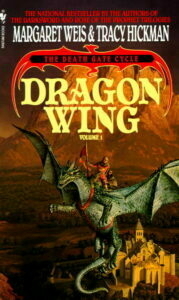Dragon Wing

Yesterday, I finished reading Dragon Wing, the first of the seven books that are part of the Death Gate Cycle, an adult fiction series created by authors Margaret Weis and Tracy Hickman during the 1990’s.
The whole series is set in a fantasy world where magic and technology are divided into five separate realms. The story depicts several fantasy races and cultures, including humans, elves and dwarves, but centers on races created by the authors, namely the Sartan, an ancient race of powerful wizards, skilled in the use of both magic and technology, who possess the ability to shape reality according to their will, who created the Death Gate, a portal that separates — and connects — the world into five realms; and the Patryn, a race of outcasts and rebels, skilled in the use of runes which allow them to manipulate reality through language and symbols, all of them banished to the Labyrinth by the Sartan.
Dragon Wing introduces us to Haplo, an assassin from one of the five realms, as he travels through the Death Gate towards the world of Arianus, to prepare for the arrival of his master, the Lord of the Nexus. Meanwhile, Hugh the Hand, an infamous assassin raised by Kir Monks after his mother died, is hired by Stephen, king of the human realm, to have his child, Prince Bane, murdered. Hugh then sets on a journey with Bane, with the excuse of fleeing the prince from its home because he’s being persecuted by people meaning to do him harm, during which they come across Alfred, the Prince’s chamberlain, who followed them in order to protect the child, but who has secrets of his own.
After leaving behind 433 very well-written pages and the first book, I have some thoughts I want to share.
First, considering that I came across this book entirely by accident, after I saw it mentioned in Mastodon, it beats me how come the Death Gate Cycle be seldom mentioned beside other fantasy series such as the LOTR by Tolkien, ASOIAF by George R. R. Martin, or The Wheel of Time, started by Robert Jordan and finished by Brandon Sanderson after the author’s death. After all, all these series share the greatness in storytelling and world building. From the ones I cited, only ASOIAF started to be written after the Death Gate Cycle, so I couldn’t find any explanations on its lack of mention. And it is a shame, I have to say, not seeing it mentioned more often.
Second, as I said before, this first book, at least for me is completely unputdownable. Now, I’m saying this being a non-native English speaker. As such, despite the fact of having been an English teacher in Brazil in the past, a good and well-written book with a fluent story considered, it takes me much longer to read books in English than it would in Portuguese, for obvious reasons. As the Death Gate Cycle has never been translated to Portuguese, my only option was to read it in English. Still, it took me only 13 consecutive days to finish reading (mind that I had to stop to do other things, as most everybody, meaning I wasn’t dedicated to reading the book). The story is very fine, so it was converted into a page-turner for me, automatically. And I guess I owe that to the authors, who have been able to wrap their intended plot in such a way that it is rich to the right point (yes, Tolkien, I’m looking at you and your veeeery long scenario and mostly everything else descriptions 😈) besides being filled with plot twists, so I came to the concluding chapters with so many open questions yet, and I loved that everything concluded in a way that seemed only proper.
Third, the Death Gate Cycleshares a characteristic with both LOTR and The Wheel of Time. The fact that these series have all been finished already (yes, George R. R. Martin, I’m looking at you and your unfinished business 😡). As such, it’s much more pleasing to me to have all the books already launched, so I can properly take my reading to an end. Now, I’ve read series while they hadn’t been finished yet (such as the Harry Potter books), but because I saw the commitment the author had to finish it. And I can’t see the same dedication, I’m sorry to say, coming from the author of ASOIAF. But this is not the main topic here.
So, in conclusion, as Limbeck Bolttightener, another of the marvelous characters in Dragon Wing, a dwarf from Drevlin, would say, I felt so compelled to write about my feelings for this book that I needed to do it as soon as possible. And I’d like to totally recommend it to anyone out there, interested in adult fantasy fiction books, as I know you won’t regret it. From my part, as I write these closing words, I’ve already started reading the next installment in the series, Elven Star, hoping that the story keeps the pace. I guess I won’t be disappointed.